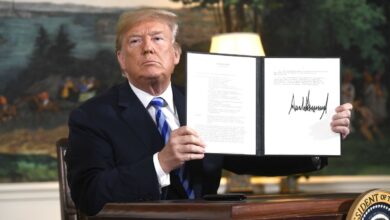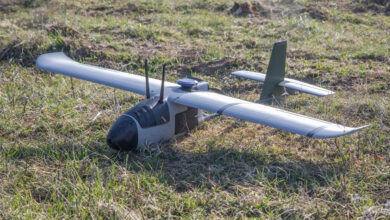French naval base in UAE to host European-led Gulf maritime monitoring mission
A European-led maritime mission to monitor Gulf waters will be stationed at the French naval base in Abu Dhabi, the French defense minister said on Sunday, November 24.
Since May, tensions in the Gulf have escalated following a string of attacks on oil tankers that the United States and its allies blamed on Iran.
Iran, which has denied any responsibility for the attacks, has put forward its own proposals for boosting Gulf security that pointedly exclude outside powers.
“We formally agreed that the command center of the European maritime surveillance initiative will be on UAE territory,” French Armed Forces Minister Florence Parly told AFP.
It will be run by around 10 to 15 staff members deployed at the French naval base in Abu Dhabi who will “contribute to making maritime navigation in the Gulf as safe as possible,” she said on a visit to the base.
Parly did not identify the countries that would be joining the mission, saying that some were still waiting for their respective parliaments to ratify their participation in the initiative.
France ‘will coordinate with the Americans’
Earlier this month, a U.S.-led maritime coalition launched Operation Sentinel to provide protection to shipping in Gulf waters. Based in Bahrain, which hosts the U.S. Navy’s Fifth Fleet, the new mission will see vessels escorted by naval ships through the Strait of Hormuz, the strategic chokepoint at the head of the Gulf and the main artery for the maritime transport of Middle East oil.
Although the United Kingdom has joined the new U.S.-led coalition, other European governments have declined to take part, fearful of undermining their efforts to save the landmark 2015 JCPOA nuclear accord with Iran. Animosity between Tehran and Washington has soared since President Donald Trump last year unilaterally abandoned the Joint Comprehensive Plan of Action nuclear deal and reimposed crippling U.S. sanctions.
“I would like to add that we are not subtracting anything, we are adding, as a number of countries would not have participated in the American initiative anyway,” Parly said on Saturday at the annual Manama Dialogue on regional security.
But on Sunday Parly said France “will coordinate with the Americans.”
Parly on Saturday criticized the U.S. for its failure to respond to provocations blamed on Iran, and took aim at U.S. disengagement in the Middle East.
“We’ve seen a deliberate gradual U.S. disengagement,” Parly said, adding it had been “on the cards for a while” but had become clearer with recent events.
“When the mining of ships went unanswered, the drone got shot. When that in turn went unanswered, major oil facilities were bombed. Where does it stop? Where are the stabilizers?” she asked.
“The region is accustomed to the ebb and flow of U.S. involvement. But this time it seemed more serious.”
General Kenneth McKenzie, commander of U.S. Central Command, which covers the Middle East, also deflected the criticism of America’s role in the region, although he conceded it may not top the list of priorities.
“We have a carrier in the theater, we’ve reinforced Saudi Arabia … so I’m not sure I would agree with the narrative of abandonment or a narrative of walking away,” he told reporters on the sidelines of the conference.
“Clearly the United States has different global priorities and this is probably not the highest global priority, but I think it remains a very important thing for the United States.”
Earlier, he told the forum: “There is a lot of water to cover. Simply put, we don’t have sufficient resources to be where we want to be in the right numbers all the time.”
On Sunday Parly also said that France will send a radar to Saudi Arabia to help bolster the kingdom’s defenses.
Parly arrived late Saturday in the UAE and held talks with Abu Dhabi Crown Prince Mohammed bin Zayed Al-Nahyan, according to the UAE state news agency WAM.
The two countries share strong ties and are engaged in a number of defense agreements.
In 2009, France opened its first military base outside Africa in the UAE in 2009, and around 700 personnel are permanently stationed there.
Gulf shipping incidents
Persian Gulf shipping problems began on May 12, when the UAE said four commercial oil tankers – two Saudi, one Emirati and one Norwegian – had been targeted by “acts of sabotage” in waters off its coast.
A month later, the Kokuka Courageous was hit and around the same time another tanker in the area, the Norwegian-owned Front Altair, was damaged by three explosions, according to the Norwegian Maritime Authority. They were transiting through the Strait of Hormuz towards the Indian Ocean.
Tensions escalated on July 19 when Iran impounded a British-flagged tanker with its 23 crew aboard as it passed through the Strait – the world’s busiest oil shipping lane. That prompted the U.K. to order the Royal Navy to escort British-flagged ships in the Strait of Hormuz.
Then on September 14, drone strikes targeted two key Saudi oil facilities onshore, causing catastrophic damage and temporarily knocking out half of the kingdom’s oil production.
The attacks were claimed by Yemen’s Iran-backed Houthi rebels, but the U.S. and Saudi Arabia – which leads a coalition fighting the Houthis – blamed Iran, saying the strikes were carried out with advanced missiles and drones.
With reporting from AFP












